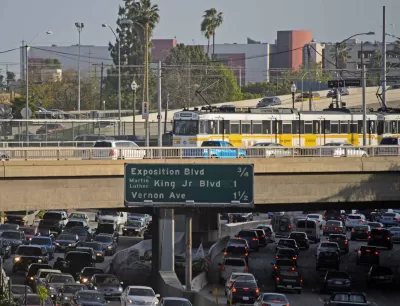A single sales tax measure that would add a new half cent sales tax to fund transportation projects in Los Angeles County for 40 years, and extend an existing half-cent sales tax that terminates in 2039, is supported by at least 68 percent of voters.

The measure, which could be placed on the ballot in Los Angeles County on Nov. 8, is both an addition and successor to the 2008 Measure R. It would need to pass by two-thirds per California law.
The legislation enabling the new tax to be placed on the ballot [SB-767 Los Angeles County Metropolitan Transportation Authority (Metro): transactions and use tax, authored by Senator Kevin de León (D-Los Angeles)] was signed into law by Gov. Jerry Brown last October.
"The Metro board is set to decide [on June 23] if it will place a measure on the November ballot that, if passed, would raise the countywide sales tax an extra half-cent above the existing Measure R half-cent tax approved by voters to fund transportation projects," writes Debbie L. Sklar for MyNewsLA.com.
Once Measure R ends in 2039, the new half-cent sales tax — as yet unnamed — would become a full cent and sunset in either 2057 or 2067.
The proposed plan would raise about $120 billion dollars over four decades for public transportation and highway projects, as well as street improvements and upkeep of public transit equipment.
According to two recent polls by Metro, the tax measure received 68 percent and 72 percent approval, with the former poll taken by phone, the latter at live forums conducted by Metro.
Additionally, 81 percent of telephone participants said they would support the idea of continuing on after 2067 with a smaller, quarter-cent tax to keep the system in “good working condition,” with that percentage going up to 88 percent for people surveyed at the forums, Metro spokeswoman Pauletta Tonilas said
Sklar goes on to describe the extensive public outreach efforts conducted by Metro, in both live and telephone forums.
Public input regarding rail projects revolved around speeding up rail line construction projects, separating rail from road crossings, more parking at stations, upgrading the Orange Line bus system to light rail and improving connections between bus and rail.
There was also interest in more funding for carpool and toll lanes, sidewalk and pothole repairs and improving pedestrian routes, while there were comments that urged less spending on highways.
Public meetings, as well as access to the draft potential ballot measure expenditure plan can be found on this Metro webpage.
The Los Angeles County Metropolitan Transportation Authority operates the third-largest public transportation system in the United States by ridership (per Wikipedia), after the New York Metropolitan Transportation Authority (MTA) and the Chicago Transit Authority (CTA).
FULL STORY: Transportation tax hike backed: You want to pay more?

Maui's Vacation Rental Debate Turns Ugly
Verbal attacks, misinformation campaigns and fistfights plague a high-stakes debate to convert thousands of vacation rentals into long-term housing.

Planetizen Federal Action Tracker
A weekly monitor of how Trump’s orders and actions are impacting planners and planning in America.

Chicago’s Ghost Rails
Just beneath the surface of the modern city lie the remnants of its expansive early 20th-century streetcar system.

Bend, Oregon Zoning Reforms Prioritize Small-Scale Housing
The city altered its zoning code to allow multi-family housing and eliminated parking mandates citywide.

Amtrak Cutting Jobs, Funding to High-Speed Rail
The agency plans to cut 10 percent of its workforce and has confirmed it will not fund new high-speed rail projects.

LA Denies Basic Services to Unhoused Residents
The city has repeatedly failed to respond to requests for trash pickup at encampment sites, and eliminated a program that provided mobile showers and toilets.
Urban Design for Planners 1: Software Tools
This six-course series explores essential urban design concepts using open source software and equips planners with the tools they need to participate fully in the urban design process.
Planning for Universal Design
Learn the tools for implementing Universal Design in planning regulations.
planning NEXT
Appalachian Highlands Housing Partners
Mpact (founded as Rail~Volution)
City of Camden Redevelopment Agency
City of Astoria
City of Portland
City of Laramie



























